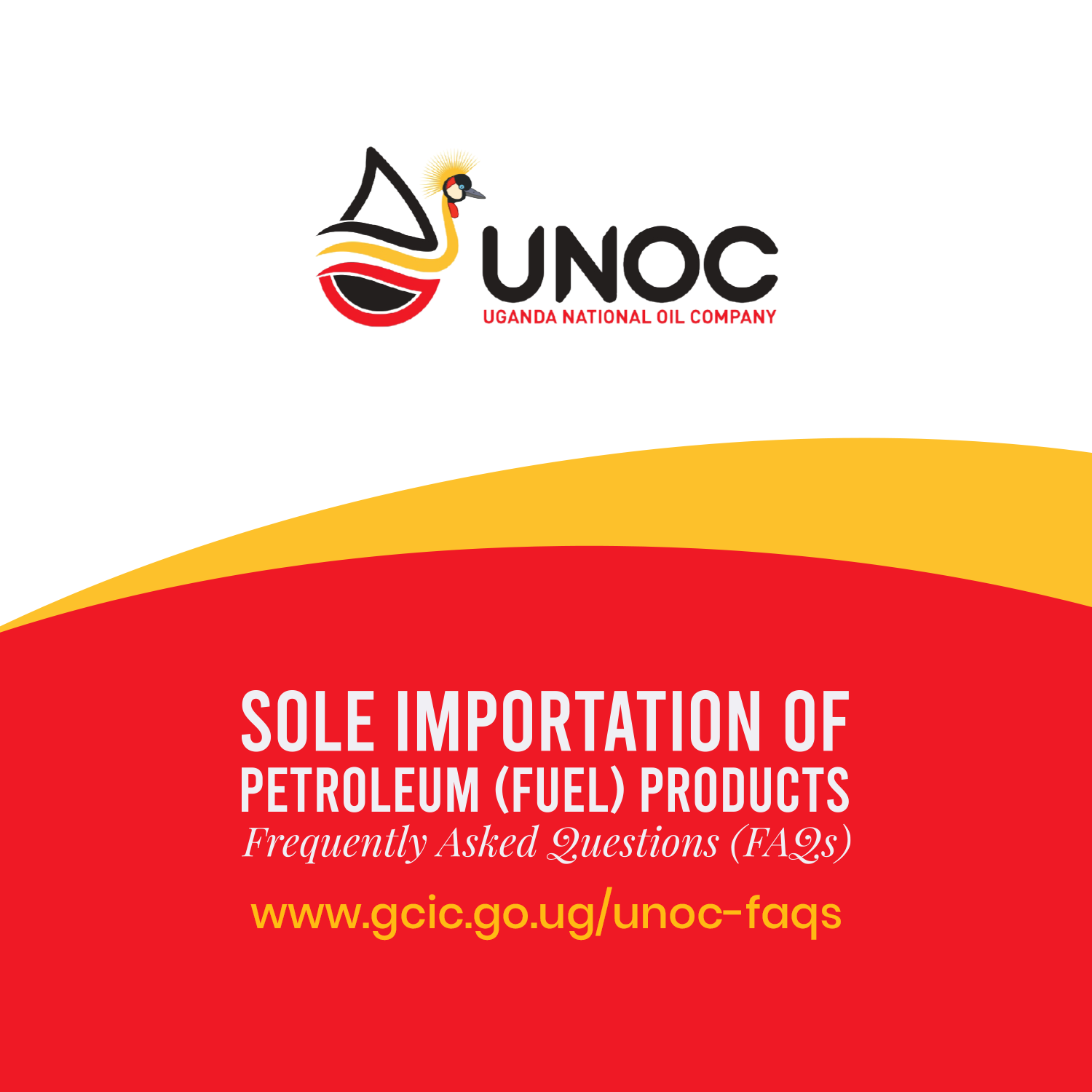
How will the direct importation of oil streamline the supply chain and distribution process?
- UNOC will help MEMD to have a clear visibility of the supply chain from product sourcing up to the loadings for the oil marketing companies (OMCs) in Kenya, Tanzania, and in Uganda (buffer/security stocks). By engaging routinely with the supply partner and monitoring the global supply chain, UNOC with the support from MEMD, will be able to make timely interventions whenever implementation of supply plans encounter challenges/interruptions.
- UNOC will be able to link the supply chain performance of product imports and the distribution being made within the country by the OMCs and this will streamline product import planning with the distribution in-country and the timely activation of the mitigation plans for countering the supply interruptions.
- Some of the mitigations include ensuring that the Jinja Storage Terminal will always be sufficiently stocked together with other selected terminals/depots within the country alongside holding sufficient buffer stocks in Dar-es-Salaam consigned to UNOC for delivery to the OMCs from Uganda and Dar-es-Salaam. These have been contractualized in the supply agreements.
- In addition, the Ugandan OMCs will now access their monthly product requirements directly from UNOC whose focus will be serving the Ugandan market.
Can we expect a reduction in pump prices due to the elimination of middlemen, and if so, by how much?
- The direct importation of the petroleum products by UNOC will indeed eliminate the unwarranted transactions within the supply chain. Part of the cost savings made by UNOC will be transferred to the OMCs and we believe that they will in turn transfer some of the benefits to the consumers at the retail pumps. Please note though that the final retailing prices may differ from one OMC to another based on the extent of logistical, network, and operational costs.
- UNOC has negotiated competitive product costs with the supply partner and included clauses in the Agreements to ensure the product cost to Uganda always remains competitive.
- UNOC’s sole importation mandate requires it to transact directly with the Ugandan Oil Marketing Companies (OMCs) involved in the product importation. The Ugandan OMCs will be given a competitive price against each vessel import. With the shifting of the business from Kenya to Uganda, the product cost is expected to stabilize and increase competition between the OMCs in the Ugandan market to the benefit of the consumers.
What quality assurance measures are being implemented to ensure that the imported oil meets international standards?
UNOC entered into a partnership with a global trader and reputable supply partner: Vitol is the leading independent trader in the World with over 50 years of experience. As a globally recognized company Vitol is bound to standards and therefore will supply UNOC with quality products.
At the receiving terminals in Mombasa and Dar-es-Salaam, the product will only be received (by UNOC for discharge into the receiving terminals) upon passing the quality checks by independent surveyors, which will be a key requirement before loading.
The applicable quality standards and checks have been imbedded into the agreements.
How will the government monitor and regulate the quality of oil being imported directly?
- Besides the quality checks outlined above, Government has contracted a service provider to monitor compliance of the quality of fuel that enters the country. Additionally, UNBS carries out routine checks in throughout the country with punitive actions against OMCs whose fuel quality is found to be substandard.
- It should be noted that the quality of product into Uganda has remained good and consistent over the past years. The introduction of UNOC as the sole importer also provides for ease of traceability should there be any incidences of adulteration on the market. The OMCs also self-regulate to ensure that they maintain quality products so that they do not lose their market share.
What is the tariff UNOC is paying for use of the Kenya pipeline? Where will the transportation terminate?
- KPC currently charges a tariff of $35.06/m3 (revised by the Regulator in Kenya to $37.83/m3 from 15th July 2024) from Mombasa to Western Kenya plus an additional storage and handling fee of $3.74/m3. This is payable by all users of the pipeline up to Western Kenya. There are additional costs for prolonged holding of the product in the pipeline.
- Note that the cost of transportation of the petroleum product from Western Kenya to Kampala in Uganda averages about US $40/m3.
What is the implication of this tariff on retail prices in Uganda?
Logistics are a pass-through cost to the final product price and therefore the cost of the transportation has to be incorporated into the product cost buildup up to consumer and the pump price.
How much oil does UNOC plan to import monthly?
The Ugandan demand averages 80,000MT of Petrol, 80,000MT of Diesel, and 14,000MT of a combination of Jet-A1 and Kerosene. UNOC is tasked to make this demand available to the OMCs on a monthly basis on top of the buffer stocks it will be holding in country.
What is the country’s daily consumption of petroleum products, and at what rate is it growing?
The aggregate demand is 174,000MT as indicated above, growing at an average of 7% per annum. Converting this into litres, on a daily basis, Uganda consumes about 7 million litres of petroleum products.
How will the oil be transported to Uganda after terminating from the pipeline, and whose responsibility is for transporting it into the country?
When the product is delivered to Western Kenya, the responsibility of transporting the products into Uganda remains with the Ugandan Oil Marketing Companies, who are currently using a combination of road tankers (trucks) and barges on Lake Victoria. UNOC will transport the petroleum products through its supply partner into the country for purposes of holding security/buffer stocks.
Of what value is this deal to Ugandans?
Uganda will be in full charge and control of its petroleum products imports through UNOC. By eliminating unwarranted transactions within the supply chain, UNOC will deal directly with the Ugandan OMCs and deliver to Uganda the resultant benefits that will include: –
- Visibility of the entire supply chain and market dynamics, from product sourcing up to the market in Uganda with resultant timely interventions whenever required.
- A stable product cost (free of occasional speculative spikes) within each month of supply to the Ugandan OMCs that are involved in products importation. This will contribute to normalization of the final prices at the retail pumps.
- More investments in terms of product financing through the commercial banks in Uganda, new registrations and setting up of retail networks in Uganda by the foreign OMCs intending to participate in the product supply and distribution within the deregulated Ugandan market. This will positively impact a cross section of related businesses as well as provide employment opportunities to Ugandans.
- Revenue generated by UNOC’s involvement in the supply chain will reduce its over-dependence on the National Treasury for financing of some of its projects and operations.
- The revenue turnover by UNOC will also enhance the bankability of some of its projects and thus attract favorable alternative funding to provide further relief to the National Treasury.
What is the update on the Tanzania route?
- The petroleum products import by UNOC through the Tanzanian route, in the implementation of the sole importation mandate, is expected to start within August 2024. It was imperative that UNOC delivers a seamless transition of importation structure through Kenya, where more than 90% of the imports are handled due to the logistically competitive enabling product pipeline system.
- UNOC is in the process of finalizing multi-model logistical arrangements to competitively transport the petroleum products from Dar-es-Salaam to Jinja and Kampala alongside availing stocks for some OMCs to lift by themselves from Dar-es-Salaam.
- The above will in the interim provide for competitive pricing of petroleum products via this route as we wait for the completion of the Tanzanian SGR project and the construction of the Dar-es-Salaam – Kampala petroleum product pipeline to enhance the volume of products imported through Tanzania.
Has UNOC considered the risk of having a single supplier? Should the suppliers’ operations be disrupted, the entire country will be at risk of not receiving petroleum products. How is this vulnerability being addressed?
- Yes, the risk of a single supplier has been well analyzed by UNOC, supported by both the Ministry of Energy and Mineral Development and the office of Attorney General as the mandate is of a national level.
- Several mitigation actions have been put in place including provisions in the Petroleum Supply (Amendment) Act, 2023 that provide for interventions by the Minister of Energy and Mineral Development in the event such risks crystalize. In addition, the risk of failure to supply the required petroleum products has been contractualized in the supply agreement between UNOC and its supply partner with the first line interventions within the control of UNOC: to arrange for alternative spot transactions for the immediate term.
Clarify the recent matter regarding UNOC’s first consignment under sole importation? Specifically, explain the “bond”.
The bond relates to one of the independent private storage terminals, VTTI Mombasa, which will be handling and storing some of the Diesel imports. We await a resolution and communication on the indicated bond issue and are optimistic that this will not significantly affect the cost of diesel sold to the Ugandan OMCs.
What is the storage capacity in the country?
- UNOC is operating a 30 million Litre capacity storage terminal in Jinja. In addition, UNOC is working with its strategic partner to embark on the development of the Kampala storage terminal with an estimated capacity of 320 million Litres, to be developed in a phased manner starting with 105 million litres and ramping up to the 320 million litres to accommodate the refined petroleum products from the planned Uganda Refinery once commissioned.
- In addition, there are other privately storage terminals and depots in the country, including the Mahathi Infra (Lake Victoria Logistics) terminal with a capacity of 70 million litres and other OMC depots contributing to another 70 million litres of storage capacity within the country.
Is UNOC pushing Mahathi Infra out of Business?
- Absolutely not! Mahathi Infra is a logistics provider and therefore complements the petroleum importation business by providing the oil marketing companies with a competitive option of transporting the products via the lake into the interim storage at Bukasa before the products are delivered to the service stations or the respective OMCs depots.
- UNOC’s obligation is to import and ensure that the product is delivered to the OMCs through the existing logistical systems. UNOC may explore options of securing additional storage from Mahathi Infra to improve the stock holding levels within the country, therefore we see an opportunity to utilize the facilities to enhance their asset utilization.
Why do oil marketing companies have different prices for petrol and Diesel even when UNOC is giving all of them the same Price.
UNOC is not in the retail business and therefore does not have the actual inputs of the details of price variations. However, we are aware that all the OMCs incur some of the product costs at different rates and terms including forex rates, transportation from Western Kenya to Kampala, storage, and depot operational costs. The OMCs also differ in the level of investments made with the retail networks and their standards as well as the related product distribution and customer service systems including value propositions and associated overheads.





